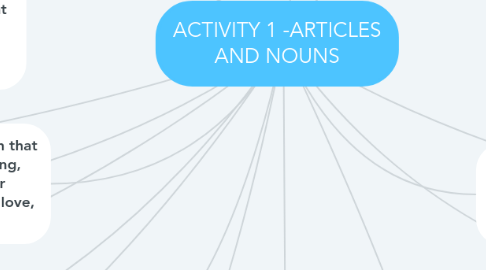ACTIVITY 1 -ARTICLES AND NOUNS
by Eduardo Mancia

1. IRREGULAR PLURAL NOUNS: are nouns that do not become plural by adding S or ES, as the most nouns in the English language do. For example : man= men, person= people, mouse= mice, child= children, foot= feet, goose= geese, tooth= teeth
2. COUNTABLE AND UNCOUNTABLE NOUNS: when you learn a new noun, you should check if it is countable or uncountable and note how it is used in a sentence. Countable nouns can be counted for example: apples, two apples, three apples. Uncountable nouns cannot be counted, for example: air, rice, salt, butter, meat, cheese, sugar, water, milk, soup, tea, etc
3. SINGULAR AND PLURAL NOUNS: a singular noun names one person, place, thing, or idea, while a plural noun names more than one person, place , thing , or idea. When you write about more than one of anything, you usually use the same word, simply adding an S, ES, or IES to the end. For example: days, taxes, ladies.
4. CONCRETE NOUNS: perfume, smoke, silk, velvet, music, coffee, hamburger, cat, soap, cotton, lemonade, mouse, stove, sand, chair, book, newspaper, radio, fish, grapes.
5. ABSTRACT NOUNS: jealousy, anger, friendship, habit, manners, symphaty, promise, sadness, love, partnership, routine, system, life, fear, ability, luck, beauty, energy, success, tragedy, childhood, idea, imagination, thought.
6. CONCRETE AND ABSTRACT NOUNS: these name things that have to do with how you perceive them with your senses such as touch, taste, sight, sound, and hearing. CONCRETE NOUNS name things that you can identify with your senses whereas ABSTRACT NOUNS name qualities or ideas that cannot be named with your senses.
7. GRAMMAR: in my opinion, it is a set of rules that we use for writing well. In other words we use grammar to help us form sentences that make sense and can communicate our ideas.
8. DESCRIPTIVE GRAMMAR: on the other hand, this describes how language is used by its speakers. Does not deal with what is good or bad language use, for example: many speakers pronounce in for the ( ing ), in oral speech and most written language we say prepositions at the end of sentences, some dialects of English do not pronounce - r - after vowels.
9. NOUN: is a part of speech that names a person, place, thing, idea, animals or quality, for example: Jonh, park, ball, love, monkey, good.
10. PROPER NOUNS: is a specific name for a particular person, place, or thing. Proper nouns are always capitalized in English, no matter where they fall in a sentence. For example: Mr. James, Dr. Morgan, UCLA, Amazon, Prospect park, Atlanta, New York, Atlantic Ocean, California, mount Kilimanjaro, Australia, Empire State Building, Walt Disney, English Grammar Revolution.
11. COLLECTIVE NOUNS: is a word or a phrase that refers to a group of people or things as one entity. Collective nouns are usually used with singular verbs: the family is on holidays. Here we have more examples: a basket of fruit, a batch of bread, a battery of guns, a bowl of rice, a bunch of crocks, a catalogue of prices, a chest of drawers, a choir of singers, a fleet of ships, a forest of trees, a gang of prisoners, a group of dancers, a group of islands, a party of friends.
12. POSSESSIVE NOUNS: is a noun that possesses something. In most cases, a possessive noun is formed by adding an apostrophe "S" to the noun, or if the noun is plural and already ends in S, only an apostrophe needs to be added. For example: dog's house, girl's dolls, book's words, car's engine, sister's room, Jim's pen, my mom's bag, my brother's bike. EXAMPLE OF PLURAL NOUNS: dogs' house, girls' dolls, cars' engine, my sisters' room, my friends' bike, the doctors' office, the pilots' airplane.
13. THE INDEFINITE ARTICLES: is the word A or AN. It is used before a noun to define it is somothing non specific, something generic or something mentioned for the first time.
14. THE DEFINITE ARTICLES: is the word THE. It is used before a noun to define it as something specific previously mentiioned or known, something unique, or something being identified by the speaker.
15. PRESCRIPTIVE GRAMMAR: describe when people focus on talking about how a language should be used. It deals with what the grammarian believes to be right and wrong, good or bad language use; not following the rules will generate incorrect languaje, for example: do not use aint, do not use a preposition to end a sentence with, pronounce the ing at the end of words, not in.
16. ARTICLES:Basically, an article is an adjective, like adjectives, articles modify nouns. English has two articles: THE and A/ AN-


